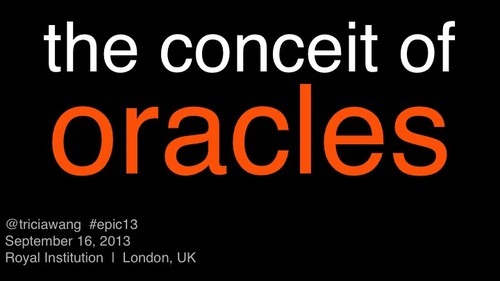Notes to my EPIC 2013 Keynote - The Conceit of Oracles: How we ended up in a world in which quantitative data is more valued than qualitative data.
Current Berkman People and Projects 2014-01-14
Summary:

In September 2013, I delivered the opening keynote to the EPIC (Ethnographic Praxis In Industry Conference) 2013, a conference for people who care deeply about making organizations more human-centered. EPIC is a truly an interdisciplinary gathering, bringing together people who work in marketing, strategy, design, research, and academia.
The conference was so amazing that Ethnography Matters has dedicated this month’s theme to the best presentations, workshops, and discussions from EPIC attendees.
While I speak regularly at conferences, this was my first time talking at an event for ethnographers. I was a bit scared to speak at EPIC (I don’t know why, since ethnographers are more empathetic than most!). In the end I had a wonderful experience and it was so refreshing to be around people who understand the nature of my work.
At this conference, I did not have to worry about the audience making assumptions about ethnographers. I was relieved that attendees didn’t assume that I don’t do strategy and only sit around watch people all day. And when I said I was an ethnographer, no one gave me a blank face and tried to escape the conversation. And I never heard anyone condescendingly ask: “So does that mean you’re not an engineer or designer?”
Something that made me really excited about my keynote was when I realized that I would be in the same exact building, The Royal Institution, where scientist Michael Faraday had demonstrated electricity to the public for the first time at the infamous Christmas Lecture in 1856. So there I was,157 years later, standing in the same exact place and in the same pose as Faraday.
What made this moment even more special was that it just so happened that a portion of my talk was also about electricity! I talked about the connection between the invention of devices to measure electricity and the invention of computers. (For example, the first commercial computer, the Ferantti Mark 1 was created at Ferranti Unlimited, an electricity company in Manchester.)
When I shared this historical link in my talk, I had to pause and ask people to photograph me in front of the podium, in the same position and pose as Faraday. I think at the time, I said something like,
“who would’ve thought that 157 years later, some Chinese-American chic would be standing in the same spot talking about electricity? Can someone please take a picture?”

Thank you to fellow ethnographer, Julian Cayla, who took this photo of me juxtaposed above Michael Faraday. In this magical moment of historical, technological, spatial, and intellectual serendipity–standing in the same pose as Faraday with my arms left arm pointing upwards–I felt like I had entered into a magical wormhole of ethnographic delirium that erased over a century of separation between these two moments in time.
You can read/download the unedited notes for all 5 parts of my 45 minute talk. I also have created a research blog on tumblr for this talk that tracked all my sources and thought processes.
to read my talk in its entirety. Here is the summary and some excerpts from my presentation below that will hopefully entice you
Technology is playing an increasingly large role in decision-making processes. But are we really making more informed decisions? How do we even know we are asking the right questions? And what are we missing in our measurement-driven world?
This talk seeks to answer these questions by looking at methods of prediction from the Oracle of Delphi in Ancient Greece to the use of electricity during the Scientifi